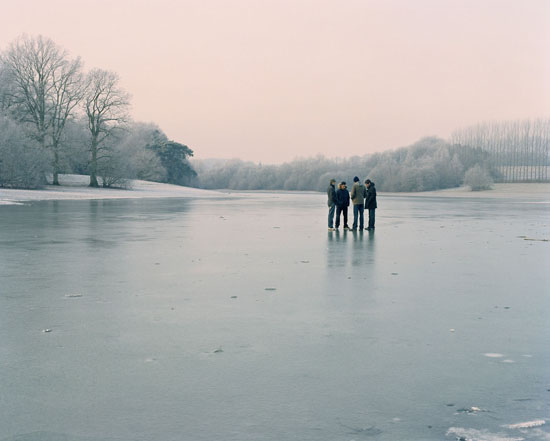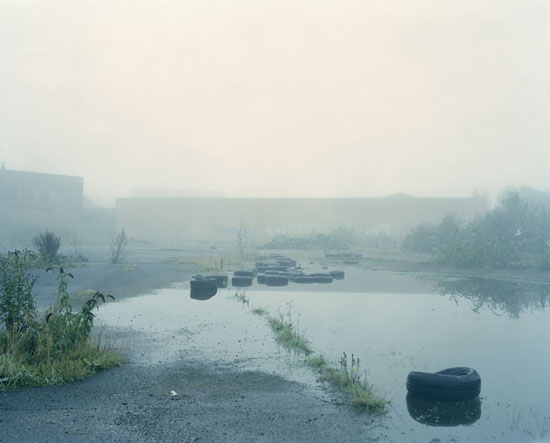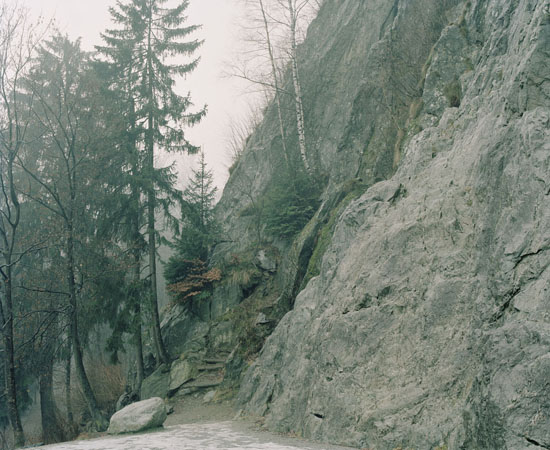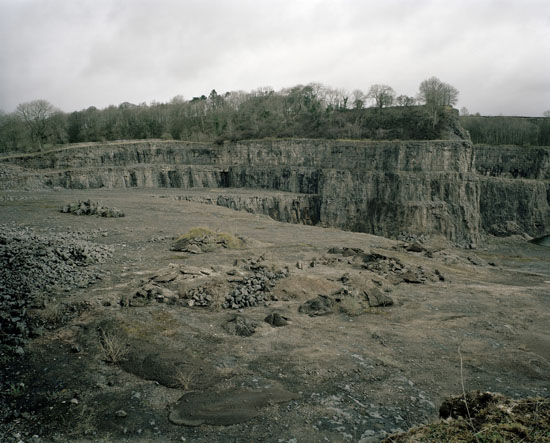In the departure lounge of Gatwick’s north terminal, surrounded by slipstreaming tails of tourists, gleaming shopfronts and billboard images of unattainable wealth and beauty, stands an old and lonely-looking silver fountain. The fountain – which long ago ran dry – is shaped like a cone of paper tapering upwards to a point, and appears to be bolted together from strips of sheet metal. The thing is an eyesore, a semi-comical temple to total uselessness in an arena otherwise devoted to an awkward mix of luxury and efficiency, and the authorities have done their best to shield it from view with beds of plastic plants.
When a rare trip abroad leads me to Gatwick, as it did yesterday, I always find my way to the first floor balcony, and for a few moments it feels as though the clamour ceases, the hordes of sugar-rushing kids, sleepy couples and bleary-eyed businessmen falling into shadow as a single spotlight illuminates that fountain. Graffiti disappears from its sides, water begins flowing once more from its peak, and there, chasing each other around its base in tie-dyed T-shirts and ill-fitting Doc Martens boots, are my friend Spencer and I. It’s 1991. We’re twelve years old, and about to embark on what will be the best holiday of my childhood, if not my life: a Christmas with Spencer’s family in Orlando.
The memory is as unreliable as memory itself – I’m sure our first attempts at tie-dying didn’t occur until 1992, and I know that I didn’t own a pair of DMs on that trip because I was constantly pestering Spencer to lend me his – but as a source of sweet sorrow it is beyond compare, and so I leave it unaltered. Yesterday, however, I found myself contemplating for the first time an eerie similarity between the memory and the fountain that serves as its catalyst: I realised that both could be seen as obstacles to the increasingly rapid current of progress.
As I queued for the plane with two hundred passengers all projecting into the portal of their phones, I sensed how large the future loomed, the vacuum at its centre sucking all presence out of the present and making an irrelevance of the past. I thought back to interviews I’d conducted for Google’s Think Quarterly magazine in the months before I gave up writing – Ray Kurzweil on the merging of man and machine, Peter Diamandis on the dream of establishing a human outpost on Mars – and felt both the optimism and unease that the evolution of technology inspires: optimism that things can only get better; unease that the things we love, perhaps even life itself, may soon be rendered obsolete.
It was a conundrum alluded to in a note I’d posted two weeks earlier to explain why I was leaving Facebook. I suggested that while we might one day end up evolving into beings of pure energy, discarding our mortal frames and exploring inner and outer space in harmony, between now and that time I saw only a diminishing of life into a sort of reality television show, a dismantling of everything I loved about the culture of contemplation and reflection. I hated where all this reductionism was taking us – hated how willingly advocates of Twitter defended the art of having to bite size their sentiments and convert their emotions into information. I hated how memes and gifs were being seen as safe alternatives to expressing something in one’s own voice, and how every new revelation of increased speed and decreased size was hailed as an improvement – SoundCloud enabling users to skip to the drop of a song before deciding if it was worth a listen, Vine attempting to revolutionise the sharing of video by offering just six seconds in which to blow audiences’ minds.
On Twitter, of all places, I found myself airing my fears in a series of pretentious sounding tweets. ‘The less space we have to define ourselves individually,’ I wrote, ‘the less of ourselves there will be to define.’ Also: ‘The more we come to rely on technology to define the parameters of the human narrative, the less human we become.’ Needless to say I had significantly fewer followers by the time I got to point three.
Yesterday, as my plane banked over Genoa, I came across a more articulate summary in the words of Don DeLillo, from a letter to Jonathan Franzen, reproduced in a 1996 essay by the latter on the threat to literature: ‘If serious reading dwindles to near nothing,’ DeLillo wrote, ‘it will probably mean that the thing we’re talking about when we use the word “identity” has reached an end.’

The question of why I stopped writing two years ago is a painful one to pose and a difficult one to answer, but I trace the root of the problem back to my days studying journalism in Cardiff in 2001. I’d finished an undergraduate degree in English the previous summer and passed subsequent months living in Peckham Rye and doing entry level editorial work for Time Out. They were intoxicating days – filled with the swirling sounds and colours of a new city seen through young eyes, the excitement of a job that felt like a labour of love. I walked Peckham Rye Common each morning before work and peered up into various trees, attempting to decode their divine potential and decide in which the young William Blake had seen his angels. I felt the shimmering presence of a grand narrative being written in the moments between moments, and when I watched the World Trade Centre collapse with dozens of weeping Time Outers in the sixth floor television department – when I sprinted down six flights of stairs and out into the street and stared up incredulously into the blue sky over Tottenham Court Road – it seemed as though a prelude had come to a close.
Less than two weeks later, in my first lecture at Cardiff, I sat with a few hundred aspiring journalists, pens poised over unmarked pads as a man called Mike Ungersma took the stage and told us, in no uncertain terms, that we were no different. Our event, he said, may seem to be the defining moment of modern history, but so had the events that defined any number of past generations; the reunification of Germany, the Kennedy assassination, Pearl Harbour. I wrote it down without believing it – images of the second plane still screamed from newsstands, footage of the collapse still roared on TV screens, and I still found myself waking from dreams in which I was stumbling around the streets of lower Manhattan at dawn, desperately trying to alert cops and commuters to the impending tragedy but being brushed aside like a bum, ignored and verbally abused until finally I looked up and saw the first plane cleaving through the pale sky.
So began the attempt to remake myself in the image of a serious journalist, to steel myself for a life spent reporting on the reshaping of a world that had been atomized before my eyes. But therein lay the problem: political implications were of no greater interest to me in the dust cloud than they were before the towers fell. I wanted to write about the people waving shirts from 101st floor windows, not US foreign policy and its radicalizing effect on the hijackers. In 2005, after three years of juggling reviews, short stories and music journalism, I took the plunge and headed to Tehran for a three-month stint as home news editor of an English-language daily and to report on the presidential election for the Sunday Times. I’d not been to Iran for more than twenty years, and from the moment I touched down I sensed something awakening in my DNA, the unraveling of a story that I began typing in furious two-hour sittings each morning before work in the kitchen of my grandmother’s house, the floor littered with the husks of dead cockroaches.
It soon became clear that I was writing a novel, a fictionalized account of my days spent trying to look useful in midtown newspaper offices, my farcical attempts at pitching human interest stories by phone to the no nonsense Sunday Times foreign desk (illegal raves by the Caspian Sea, underground poetry clubs), who barked back that they wanted election stuff only. Who was this Ahmadinejad guy who had unexpectedly made it through to a second round run-off? Had he actually said that he planned to cut the hands off those who wanted democracy in Iran? Did he really have a chance of winning? I would invariably hang up itching to get back to my book, which was evolving into the tale of a young man tracing the story of his estranged father and uncovering, in a nod to Blake, evidence of a world behind the one we see with our eyes.
I returned to the UK with a handful of newspaper cuttings and a manuscript entitled The White World. The opening pages won a national novel writing competition hosted by the Telegraph, which saw me and four other winners taken to lunch at a French restaurant in Pimlico, where we were courted by an array of competing literary agents who smiled and refreshed our wine glasses when they weren’t glaring at each other over the table. Yet none were interested in The White World after reading more than the first few chapters; it was too personal, they said, too obvious an attempt at catharsis, as first novels tended to be. I couldn’t argue with that, but nor could I shake the feeling that what was being rejected wasn’t my first novel so much as my personal understanding of fiction as it applied to me.
So I found myself in something of a creative no-man’s land in the months and years after Iran, having seemingly proved myself incapable of writing either objective journalism or fiction that wasn’t warped by the magnetic pole of personal history. I continued going through the motions – I was still working at Time Out, where I began editing guidebooks to fill the hole in my bank account and distract myself from the breakup of my relationship with fiction. I still wrote articles and reviews, even the occasional short story, but creative expression came increasingly in the form of the electronic music that I produced in my bedroom. When a series of lucky breaks in 2010 saw tracks from my first album aired on national radio and synced to television shows, I saw it as an opportunity to bow out of journalism, leave Peckham Rye and set up as a music producer in a Brixton flat. On the rare occasions when I returned to the Common and searched the sky for some sense of narrative, I got nothing. Blake’s angels were silent, and the only world that existed was the one that I could see with my own eyes.

Reaction to my denouncement of Twitter in a series of tweets was understandably incredulous. Among those who leapt to defend social media was a writer friend who noted that every generation had its emerging literary technologies and attendant naysayers – that presumably the advent of the telegram had seen scores of people throwing out their arms in despair at the death of the handwritten letter. I understood this – recognized in it more than a hint of Mike Ungersma’s insistence that we not let September 11th’s cinematic pyrotechnics distract us from the fact that it was just another historical event. But if I didn’t entirely agree with my critics, nor did I willingly engage in debate: as with my valedictory missive to Facebook, I was simply making excuses as I backed out the door. The atmosphere at the party I left, once I was safely out on the street, was none of my concern.
The truth was that I wanted to be alone. I had been forced to admit in recent weeks that I was sliding into depression, and I wanted to understand why. In some ways I had little to be sad about: in three years my music had led to a degree of recognition I’d not found in a decade of writing. I was selling respectable amounts of records without ties to a label or manager; I had traded my home studio for a rented one in Soho, and begun writing tracks for film and television; I had completed a second album that nearly killed me, but which had been well received by my 9,000 plus followers on Facebook, from whom I received daily messages of encouragement and support.
But it wasn’t enough. Out on the street, the lights of the party receding behind me, Jon Hopkins’ ‘Abandon Window’ on loop on my headphones, I finally saw that the narrative I’d been mourning was one I had written myself, and which had died the moment I stopped writing. Putting pen to paper had its own countless ways of making me miserable, but it also served as a foundation for what I considered a life lived in full, allowing me to reflect and make sense of (if not understand) what seemed the ultimate conundrum of human existence: how to live a finite life in an infinite universe. It’s a question to which there may be no real answer, but it’s one that I personally need to be asking every day, even if my words are flung like stones into space, like the astronauts in Vonnegut’s The Sirens Of Titan, who find ‘what had already been found in abundance on Earth: a nightmare of meaningless without end.’
All of which is a roundabout way of saying that I’m going to start writing again. That these are the first words, and that I hope there will be many more. With a music career to (sort of) pay the rent, I can finally concentrate on writing the personal, cathartic stuff that matters the most, but which I always felt pressured to avoid. Which isn’t to say that I intend to write without restraint; I still consider myself a stickler for clarity and relevance, and a judicious self-editor, even if it may not be apparent in this initial outpouring. Nor would I dream of opening with an image as personal as the fountain at Gatwick without somehow bringing the whole thing full circle and artfully referring to it in my conclusion, to the extent that I have one. So here goes.
Spencer and I are still close friends – I’d say best friends, which sounds odd coming from a 34-year-old man, but there you have it. Our lives ran very much in parallel during those formative Stand By Me years – rarely a weekend went by that we weren’t round each others’ houses writing comics, building forest forts, abandoning ouija boards halfway through due to sudden, plummeting fear. We watched horror films day and night, attempted to make our own five-minute masterpieces of the macabre with my dad’s VCR camera, my brother and baby sister in supporting roles. We shared our first drinks together, our first drugs together, the details of our first encounters with girls together. When we went our separate ways after school – me to study English at Cambridge, Spencer to pursue photography at Falmouth – we did so with the same obsessions tattooed under our skin; each time we met over subsequent years, it seemed that the ink had spread to form identical butterflying Rorschach patterns, that our various battles with the slings and arrows of adult life were scored by the same strange music.
Spencer is a respected portrait photographer now. Barely a week goes by that he doesn’t snap some A-list celebrity for a major newspaper or magazine, every one rendered with a haunted gaze – a melancholic, other-worldly expression that is unique to Spencer’s work, and which has made him the toast of picture editors the world over. Yet for all his achievements – the international travel, the industry awards, the high profile shows and works acquired by major galleries – I’ve never seen Spencer so excited as when he was putting together a personal edit of landscapes and portraits from across the years, the pictures compiled on his website under the heading The Abyss Gazes Into You.
Last week I found myself in the unusual but enjoyable position of interviewing Spencer for an arts blog that was interested in the background to the project. We met in the Phoenix Artists Club in Soho, squeezed ourselves into a corner beneath walls hung with signed programs of musicals from years gone by. We spoke about Spencer’s introduction to photography; his first encounter with his mother’s camera, his first set of black-and-white photos developed in the school darkroom – pictures of hot air balloons, my baby sister, an inevitable pair of Doc Martens boots. We spoke about his documentary phase at Falmouth, his ability to coax haunting expressions from celebrities not known for their introspective sides, his insistence on using film in a digital age. Finally we spoke about the Abyss project, which Spencer explained at length, the thoughtful pauses in his answers filled with show tunes blasting from the bar stereo when I listened back on the Dictaphone that evening. He described a process almost out of his hands – how over the years he would flip through images shot for a range of personal and commercial projects and simply know that one or another had captured something sublime, hinted at something beautiful and terrifying behind everyday life. In collecting together this otherwise unrelated series of photographs – a frozen clump of dead birds, a portrait of a young BMXer, an abandoned airfield – Spencer was beginning to outline a world that he had always believed existed beyond the material veil. It was an imperfect process, and one he would be adding to for the rest of his life without hope of closure or completion, but it was also life itself, and without it, existence could have only limited meaning.
As a prism for viewing the creative process it couldn’t be more applicable to my own work. Those unexpected doorways on to the divine correspond exactly to the moments between moments that I found myself struggling to make sense of in my writing, and which ceased appearing to me when I swapped pen and paper for the warm numbness of social media, allowing it to convince me of the pointlessness of searching for personal identity when we were, after all, a single hive mind happening simultaneously. Perhaps we are, and perhaps the future really is racing towards us faster than ever, rising up in a great wave to bulldoze everything before it; at the very least, I can’t imagine it will be long before it erases our metal fountain. But in writing these words, even if no one else reads them, I feel I’m doing everything in my power to ensure that in some sense, in some place no more or less real than the table I’m sitting at now, Spencer and I will always be chasing each other around its base in our tie-dyed T-shirts and DM boots. It’s an imperfect process, but it’s the only one I know. These are my windows on to the world beyond this one: the traces we leave behind as evolving human beings, so flawed and so far from true enlightenment, finding love and learning to live on our own terms, in our own time, our world shrinking around us even as the universe expands on all sides.

Sestri-Levante, Italy, 9th July 2013
More of Spencer Murphy’s work can be viewed at http://www.spencermurphy.co.uk


